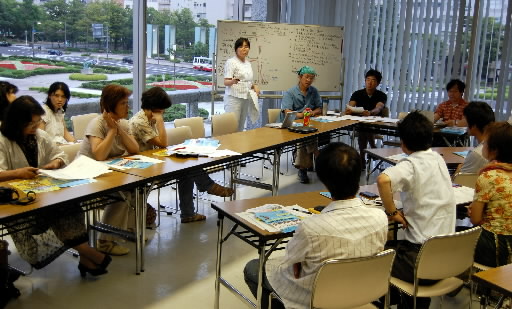Fukushima and Hiroshima: Impact on the A-bombed city, Part 3 [3]
Jul. 25, 2011
Article 3: Use of different terms
by Yumi Kanazaki and Yoko Yamamoto, Staff Writers
Sense of distance between “nuclear weapons” and “nuclear energy”
“The government calls what Japan does ‘genshi ryoku kaihatsu’ (atomic energy development), but they refer to what Iran does as ‘kaku kaihatsu’ (nuclear development),” said Hiroaki Koide, assistant professor of nuclear engineering at the Kyoto University Research Reactor Institute, in a lecture in Hiroshima earlier this month. “But in English they both use the word ‘nuclear.’ The government of Japan has used different terms for the two, but ‘kaku’ (nuclear power) and ‘genshi ryoku’ (atomic energy) are the same. I believe it would be a mistake for Hiroshima to say that ‘peaceful uses’ of nuclear energy are acceptable.” These remarks were met with applause from the audience that filled the auditorium of about 600 seats.
Differentiation from nuclear weapons
In the aftermath of the accident at the Fukushima No. 1 (Daiichi) nuclear power plant, there has been debate about the use of nuclear energy overseas as well as in Japan. Germany has revised its laws to abandon the use of nuclear power. Toshiyuki Tanaka, a professor at the Hiroshima Peace Institute of Hiroshima City University, is acting president of the Hiroshima Alliance for Nuclear Weapons Abolition. He went to Germany in June.
“The German government itself came out with the policy of abandoning nuclear power plants,” he said. “In Japan not just the government but even the citizens’ anti-nuclear movement has regarded nuclear weapons as an issue separate from nuclear energy.” The major impact of Japan’s acceptance of nuclear energy early on is believed to be behind this.
Prof. Tanaka and others are planning a world conference of “radiation victims” that will gather “hibakusha” from all over the world in Hiroshima in 2015. He hopes that looking at all types of radiation victims, going back to those who mined uranium, will be the key to bridging the gap between the understanding of “nuclear energy” and “nuclear weapons.”
Movement at turning point
This summer marks the 66th anniversary of the atomic bombing. The ban-the-bomb movement, which has led the effort to abolish nuclear weapons, has reached a turning point.
As a result of ideological and other differences, both the Japan Congress Against A- and H-Bombs (Gensuikin) and the Japan Council against Atomic and Hydrogen Bombs (Gensuikyo) hold separate conferences under the name World Conference against A- and H- Bombs. Gensuikin, which has advocated abandoning nuclear power generation since its establishment in 1971, will hold its conference in Fukushima for the first time ever this year.
Gensuikyo will hold conferences in Hiroshima and Nagasaki as usual and advocate a shift from dependence on nuclear energy to the use of natural energy sources. Masakazu Yasui, the group’s secretary general, said, “Many people have contacted us to say that Japan doesn’t need nuclear power plants or nuclear bombs.” He said he senses that the times are changing, but nevertheless there has been no collaboration across the barrier separating the two groups.
Meanwhile, an effort has begun to find a way to bridge the sense of distance between “nuclear energy” and “nuclear weapons.”
On August 6 people opposing Chugoku Electric Power Company’s plan to build a nuclear power plant Kaminoseki, Yamaguchi Prefecture, and members of the movement to abolish nuclear weapons will parade through Hiroshima together for the first time under the slogan of “a world without nuclear power plants or nuclear weapons.”
Kazuki Okada, 24, a resident of Mihara and one of the central members of the group, explained his reason for participating in this effort saying, “I realized that while calling for opposition to the use of nuclear energy I hadn’t been listening to what the radiation victims around me had to say.” Okada believes August 6 will mark the start of a collaboration that transcends existing boundaries in an effort to eliminate both nuclear power generation and nuclear weapons. The call for “No More Hibakusha” will be heard once again.
(Originally published on July 16, 2011)








